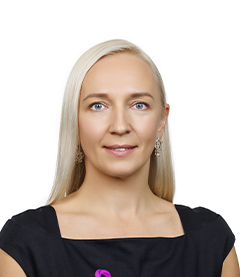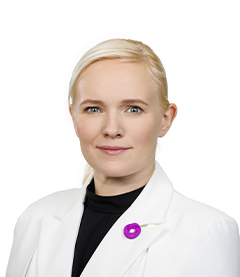-
Other audit services
We help clients with the application and use of foreign financial aid of EU and other funds and help prepare financial reports.
-
Audit calculator
The calculator will answer if the company's sales revenue, assets or number of employees exceed the limit of an inspection or audit.
-
Payroll and related services
We perform payroll accounting for companies whether they employ a few or hundreds of employees.
-
Tax accounting
Grant Thornton Baltic's experienced tax specialists support accountants and offer reasonable and practical solutions.
-
Reporting
We prepare annual reports in a timely manner. We help to prepare management reports and various mandatory reports.
-
Consolidation of financial statements
Our experienced accountants and advisors help you prepare consolidation tables and make the consolidation process more efficient.
-
Consultancy and temporary staff
Our experienced specialists advise on more complex accounting transactions, rectify poor historic accounting, and offer the temporary replacement of an accountant.
-
Outsourced CFO service
Our CFO service is suitable for companies of all sizes and in all industries. We offer services to our clients in the required amount and competences.
-
Assessment of accounting processes
We help companies to implement accounting practices that are in compliance with local and international standards.
-
Accounting services for small businesses
We offer affordable service for small businesses. We help organize processes as smartly and cost-effectively as possible.
-
Cryptocurrency accounting
We keep up with blockchain technology to serve and advise crypto companies. We are supported by a network of colleagues in 130 countries.
-
Trainings and seminars
Our accountants have experience in all matters related to accounting and reporting. We offer our clients professional training according to their needs.

-
Business advisory
We offer legal support to both start-ups and expanding companies, making sure that all legal steps are well thought out in detail.
-
Fintech advisory
Our specialists advise payment institutions, virtual currency service providers and financial institutions.
-
Corporate advisory
We advise on legal, tax and financial matters necessary for better management of the company's legal or organizational structure.
-
Transaction advisory
We provide advice in all aspects of the transaction process.
-
Legal due diligence
We thoroughly analyze the internal documents, legal relations, and business compliance of the company to be merged or acquired.
-
In-house lawyer service
The service is intended for entrepreneurs who are looking for a reliable partner to solve the company's day-to-day legal issues.
-
The contact person service
We offer a contact person service to Estonian companies with a board located abroad.
-
Training
We organize both public trainings and tailor made trainings ordered by clients on current legal and tax issues.
-
Whistleblower channel
At Grant Thornton Baltic, we believe that a well-designed and effective reporting channel is an efficient way of achieving trustworthiness.

-
Business model or strategy renewal
In order to be successful, every company, regardless of the size of the organization, must have a clear strategy, ie know where the whole team is heading.
-
Marketing and brand strategy; creation and updating of the client management system
We support you in updating your marketing and brand strategy and customer management system, so that you can adapt in this time of rapid changes.
-
Coaching and development support
A good organizational culture is like a trump card for a company. We guide you how to collect trump cards!
-
Digital services
Today, the question is not whether to digitize, but how to do it. We help you develop and implement smart digital solutions.
-
Sales organisation development
Our mission is to improve our customers' business results by choosing the right focuses and providing a clear and systematic path to a solution.
-
Business plan development
A good business plan is a guide and management tool for an entrepreneur, a source of information for financial institutions and potential investors to make financial decisions.
-
Due diligence
We perform due diligence so that investors can get a thorough overview of the company before the planned purchase transaction.
-
Mergers and acquisitions
We provide advice in all aspects of the transaction process.
-
Valuation services
We estimate the company's market value, asset value and other asset groups based on internationally accepted methodology.
-
Forensic expert services
Our experienced, nationally recognized forensic experts provide assessments in the economic and financial field.
-
Business plans and financial forecasts
The lack of planning and control of cash resources is the reason often given for the failure of many businesses. We help you prepare proper forecasts to reduce business risks.
-
Outsourced CFO service
Our CFO service is suitable for companies of all sizes and in all industries. We offer services to our clients in the required amount and competences.
-
Reorganization
Our experienced reorganizers offer ways to overcome the company's economic difficulties and restore liquidity in order to manage sustainably in the future.
-
Restructuring and reorganisation
We offer individual complete solutions for reorganizing the structure of companies.
-
Corporate taxation
We advise on all matters related to corporate taxation.
-
Value added tax and other indirect taxes
We have extensive knowledge in the field of VAT, excise duties and customs, both on the national and international level.
-
International taxation
We advise on foreign tax systems and international tax regulations, including the requirements of cross-border reporting.
-
Transfer pricing
We help plan and document all aspects of a company's transfer pricing strategy.
-
Taxation of transactions
We plan the tax consequences of a company's acquisition, transfer, refinancing, restructuring, and listing of bonds or shares.
-
Taxation of employees in cross-border operations
An employee of an Estonian company abroad and an employee of a foreign company in Estonia - we advise on tax rules.
-
Tax risk audit
We perform a risk audit that helps diagnose and limit tax risks and optimize tax obligations.
-
Representing the client in Tax Board
We prevent tax problems and ensure smooth communication with the Tax and Customs Board.
-
Taxation of private individuals
We advise individuals on personal income taxation issues and, represent the client in communication with the Tax and Customs Board.
-
Pan-Baltic tax system comparison
Our tax specialists have prepared a comparison of the tax systems of the Baltic countries regarding the taxation of companies and individuals.
-
Internal audit
We assist you in performing the internal audit function, performing internal audits and advisory work, evaluating governance, and conducting training.
-
Internal Audit in the Financial Services Sector
We provide internal audit services to financial sector companies. We can support the creation of an internal audit function already when applying for a sectoral activity license.
-
Audit of projects
We conduct audits of projects that have received European Union funds, state aid, foreign aid, or other grants.
-
Prevention of money laundering
We help to prepare a money laundering risk assessment and efficient anti-money laundering procedures, conduct internal audits and training.
-
Risk assessment and risk management
We advise you on conducting a risk assessment and setting up a risk management system.
-
Custom tasks
At the request of the client, we perform audits, inspections and analyzes with a specific purpose and scope.
-
External Quality Assessment of the Internal Audit Activity
We conduct an external evaluation of the quality of the internal audit or provide independent assurance on the self-assessment.
-
Whistleblowing and reporting misconduct
We can help build the whistleblowing system, from implementation, internal repairs and staff training to the creation of a reporting channel and case management.
-
Information security management
We provide you with an information security management service that will optimise resources, give you an overview of the security situation and ensure compliance with the legislation and standards.
-
Information security roadmap
We analyse your organisation to understand which standards or regulations apply to your activities, identify any gaps and make proposals to fix them.
-
Internal audit of information security
Our specialists help detect and correct information security deficiencies by verifying an organization's compliance with legislation and standards.
-
Third party management
Our specialists help reduce the risks associated with using services provided by third parties.
-
Information security training
We offer various training and awareness building programmes to ensure that all parties are well aware of the information security requirements, their responsibilities when choosing a service provider and their potential risks.
-
Digital Operational Resilience Act (DORA)
We will help you create a DORA implementation model that meets your company's needs and ensures that you meet the January 2025 deadline.

-
ESG advisory
We help solve issues related to the environment, social capital, employees, business model and good management practices.
-
ESG audit
Our auditors review and certify sustainability reports in line with international standards.
-
Sustainable investments
We help investors conduct analysis of companies they’re interested in, examining environmental topics, corporate social responsibility and good governance practices.
-
Sustainable tax behaviour
Our international taxation specialists define the concept of sustainable tax behaviour and offer services for sustainable tax practices.
-
ESG manager service
Your company doesn’t necessarily need an in-house ESG manager. This role can also be outsourced as a service.

-
Recruitment services – personnel search
We help fill positions in your company with competent and dedicated employees who help realize the company's strategic goals.
-
Recruitment support services
Support services help to determine whether the candidates match the company's expectations. The most used support services are candidate testing and evaluation.
-
Implementation of human resource management processes
We either assume a full control of the launch of processes related to HR management, or we are a supportive advisory partner for the HR manager.
-
Audit of HR management processes
We map the HR management processes and provide an overview of how to assess the health of the organization from the HR management perspective.
-
HR Documentation and Operating Model Advisory Services work
We support companies in setting up HR documentation and operational processes with a necessary quality.
-
Employee Surveys
We help to carry out goal-oriented and high-quality employee surveys. We analyse the results, make reports, and draw conclusions.
-
HR Management outsourcing
We offer both temporary and permanent/long-term HR manager services to companies.

-
Digital strategy
We help assess the digital maturity of your organization, create a strategy that matches your needs and capabilities, and develop key metrics.
-
Intelligent automation
We aid you in determining your business’ needs and opportunities, as well as model the business processes to provide the best user experience and efficiency.
-
Business Intelligence
Our team of experienced business analysts will help you get a grip on your data by mapping and structuring all the data available.
-
Cybersecurity
A proactive cyber strategy delivers you peace of mind, allowing you to focus on realising your company’s growth potential.
-
Innovation as a Service
On average, one in four projects fails and one in two needs changes. We help manage the innovation of your company's digital solutions!


The rapid development of artificial intelligence and the arrival of ChatGPT on the scene will not leave accountants on the street, but there will be an increasing need to get in-service training, re-train and think more like a CFO does.
“It’s still very hard to find an accountant,” said the Head of Grant Thornton Baltic’s Business Process Solutions, Gaily Kuusik on the Äripäev business daily’s radio programme ‟Kasvukursil”.
That is because technological advances raise the requirements for accountants. “There’s no more manual keying of invoices; it’s automated now. The easy work is done by machines. The need is for top specialists, people with a chief financial officer’s perspective, who is able to offer other value added to companies,” said Kuusik. “Accountants are expected to have an increasing desire to develop.”
Chairman of the board of the Estonian Association of Accountants Margus Tammeraja noted that today an accountant has to be able to answer questions about IT and the law. “We deal with all sorts of nuances from wall to wall. Since most of the companies in Estonia are micro-enterprises or small businesses who are not able to hire an in-house accountant, they expect their service provider to offer broad-based service. They want their accountant to help interpret amendments to laws, optimize taxes and so on. An accountant is becoming more of a business consultant.”
Grant Thornton Baltic’s Client Experience Manager Terje Liiv brought up the crypto market as an example. “This market is changing quite quickly, new fields keep on cropping up and now there’s a question for accountants who are looking to master these new fields,” she said regarding the constant need for development. “Many years ago, the whole sector seemed hard to grasp, but we realized that we had to train some of our accountants to be conversant in crypto. We brought ourselves up to speed with crypto software, and where to pull the data that conventional accountant and the Tax Board considered important. Only this way can the client be offered high-quality service.”
Kuusik added that the ability to adapt was indispensable here, because the number of queries grew. “The Tax Board and the Estonian government are also trying to constantly regulate this market.”
Tammeraja said: “The market does not have enough accounting capability in this field, and quite a few smaller companies have invested into crypto assets, which makes many old-school accountants anxious.”
But Tammeraja said AI was still a useful tool that helps accountants do their work. ChatGPT can provide reasonable answers on more general topics, such as decisions on tax exceptions, to the point where a tax official probably can’t tell whether the question was answered by a person or an AI.”
Oversight reduces risk of fraud
Besides accountants being able to adjust to new conditions, fraud prevention is still an important topic. Äripäev recently reported that a Kihnu Island senior accountant got their personal and the municipal purse mixed up. “Every year, some such case comes to light,” said Tammeraja.
Liiv said that oversight mechanisms should be put in place to prevent fraud. “If we’re talking about using accounting bureaus’ services, that’s safer than hiring an individual accountant, because offices have failsafes on a completely different level. For one thing, multiple people are always involved in a client’s accounting, and that rules out embezzlement. If the accountant uploads the payment slips, the final decision always belongs to the client. If an accountant is the one who signs off on it as well, fraud is more likely.”
Tammeraja said every company can do a lot to prevent fraud – they should trust but verify when it comes to their accountant. “Every entrepreneur ought to think about what the numbers they’re handed mean. They should perform a basic check, look at the bank balance and whether it matches up with the books. Certainly the accountant should be signed to a contract. Many don’t have one, but if the accountant cooks the books, the company will be in a heap of trouble.”
“Accounting programs are cloud-based in this day and age, so the CFO can always access the data at any time,” Kuusik put in. She also recommended running a background check on both accountancies or individual accountant. “The websites of specific companies should be examined, see who the people are behind it.”
Laws need reform
Besides the topics of AI and changes in accountants’ work and security issues, experts said there was also room for improvement in the field of tax laws. One that is becoming outdated is the law governing fringe benefits.
Äripäev recently reported that companies are asking for invoices from companies who provided catering to Christmas parties, as if they had been renting premises. Kuusik believes the problem has existed for years and it comes from the fact that the aim of the law is being misdirected. “Actually, companies need a way to motivate their employees and team members, to cultivate team bonding and recognize clients.”
Tammeraja said another field where something should be done is legislation on filing of annual reports. “It is obligatory for all legal persons to file reports – and there are 300,000 of them in Estonia. Only half of them do, but the state has not devoted enough attention to the matter.” He added that annual reports have to be filed even if the company did not have any economic activity in the given year. ‟In this case the report should state that.”
If you have similar challenges and questions, please contact our specialists.







